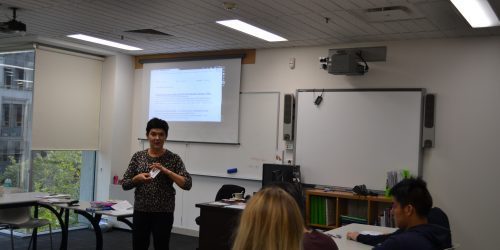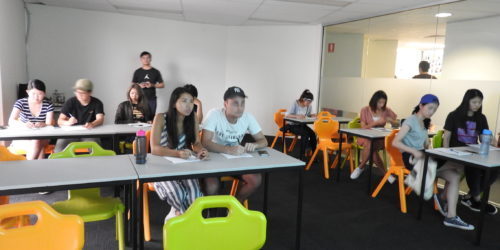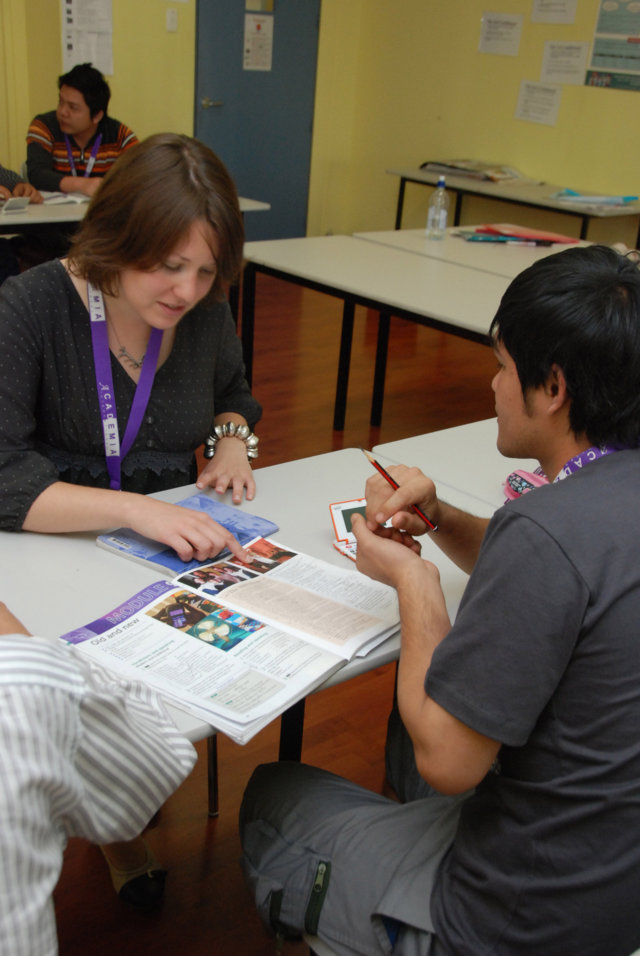Language quirks to know when you study English in Australia

Do you find some English concepts difficult? Don’t worry – so do we sometimes!
English is a weird language – unlike other languages where there are consistent rules, English is characterised by weird quirks, exceptions to the rules, and inconsistencies.
If you’ve decided to study English in Australia, you’ll want to learn about each of these weird quirks of the English language first!
Why does English have these quirks?
It’s a global language
And as a global language, it has global speakers who each bring their own unique influence to the language!
American English is a great example. During the early 20th century, American president Theodore Roosevelt ordered that English be “modernised” by simplifying the spelling.
While not all the changes were accepted (we don’t spell “although” as “altho”, for example), many of them were, creating a divide between American and other versions of English.
And this is just one example!
No standardisation
Unlike a language such as French, which has the Academie Francaise, there’s no central body that sets out the rules.
Therefore, English evolved organically over time – often in ways that ignored previously established rules and grammar!
The result? Odd inconsistencies and quirks.
English has a strange history
According to language experts and linguists, English is a blend of several different languages.
This is thanks to England’s complicated history, which introduced elements from several other European languages to the English language, including:
- German (a distant cousin of English)
- Danish (from Viking invasions)
- Latin (from the Roman Empire)
- French (the official language of England for 300 years)
Each language introduced new vocabulary, as well as changes to English grammar.
Many of the inconsistencies and quirks you find in English are the result of the conflicting rules and grammar of each language conflicting with each other.
What you need to know before you begin your English course in Australia
Homophones
Homophones are words that sound similar, but which are spelled differently, and often mean completely different things.
While homophones exist in every language, no language’s homophones are as confusing as the ones in English.
Here are two very common sets of homophones, used in everyday life, that people are notorious for confusing – even native speakers fall for these mistakes when they aren’t paying attention!
There / Their / They’re
- ‘There’ is an adverb and is used to describe location, direction or places – for example “I left my bag over there.”
- ‘Their’ is a determiner, used to determine that something belongs to someone – for example, “Sophie is their third daughter.”
- ‘They’re’ is a shortened form of ‘they are’ – for example “they’re going to the musical festival.”
Your / You’re
- “Your” is a determiner that says something belongs to someone – for example, “You left your jacket in the car.”
- “You’re” is a contraction of ‘you are’ – for example, “You’re wearing a really cool jacket today.”
The English language has grammar rules that you don’t always follow
When you enrol in an English course in Australia, one of the first things you will learn is English grammar and rules.
You will also be introduced to rules to help you understand and remember how to spell and pronounce certain words.
The problem is that in many cases, these rules don’t apply!
The ‘bossy e’ rule
This rule refers to words where the “e” is silent, but changes the pronunciation of the vowel that came before it:
- Made
- Spade
- Mine
- Cape
With all these words the ‘bossy e’ turns the pronunciation of the vowel that came before into the name of the letter, rather than the sound.
For example, the “bossy E” at the end of “shade” means you pronounce the A like you’re reciting the alphabet, while ignoring the “E” – in this case, it would be pronounced “sh-AY-d”.
The problem is this rule is not always true!
This can cause a lot of confusion when you come across words like ‘glove’ and ‘dove’. The “bossy E” is present, but where the ‘o’ is still pronounced as the sound rather than the name of the letter. Instead of “gl-OH-v”, it’s pronounced “”gl-UH-v”.
The “bossy E” isn’t the only rule like this one.
Another infamous rule in the English language that is always broken is “I before E, except after C”.
The “I before E except after C” rule
As native speakers, this is one of the first spelling rules we were introduced to in primary school.
For overseas students studying English in Australia, you may also have heard of this rule.
This rule means that every time “I” and “E” are next to each other in a word, the letter “I” should come first unless they are directly preceded by the letter “C”.
For example “I” comes before “E” in the word ‘believe’, but “E” comes before “I” in the word ‘receive’.
The problem is that English is weird – in fact, the word “weird” itself is an exception to this rule!
There’s no letter “C” in the word “weird” – however, the letter “E” still comes before the “I” anyway.
This isn’t the only case either – there are plenty of exceptions in the English language where this is again not true, including:
- Science
- Concierge
- Deficiencies
- Iciest
- Glacier
There are even cases of words where the appearance of the letters is ‘ei’ not ‘ie’ when the letters are not directly preceded by an e – like ‘caffeine’ for example.
Slang and local variations
English is a global language.
And as a global language, it has global speakers, each of whom speak a unique version of English with unique slang and words!
If you choose to study English in Australia, you’ll have to familiarise yourself with Australian slang and words if you want to understand what we locals are saying.
Click here for some examples of common Aussie slang and Australia-isms.
Study English in Australia with Academia
Academia is a nationally-recognised and well-renowned institution, with plentiful awards and industry recognition for our courses.
In particular, for the English courses we offer.
In 2018, for example, we won the Victorian Excellence in International Education Private Education and Training Award.
We offer a wide range of courses to choose from, giving you the power to pick the perfect English course in Australia best suited to your goals.
General English (GE)
General English offers English classes at a variety of skill levels that give you the skills needed to enjoy your life in Australia.
From basic conversation, to resume-writing, to formal and professional language, this course gives you the vocabulary and skills to understand and communicate in English.
Learn more about our General English course.
English for Academic Purposes (EAP)
Applying for an Australian University? You’ll need to enrol in English for Academic Purposes first!
Unlike ordinary conversation, institutions like universities use language that’s much more advanced and formal. If you want to succeed at an Australian university, you’ll need to be able to understand the type of English used at them.
In particular, EAP trains you in writing reports, essays and making presentations – all of which are likely to be part of your time at uni!
Learn more about studying English for Academic Purposes.
English for IELTS preparation
The International English Language Testing System (IELTS) is one of the most widely-used English tests in the world, recognised by hundreds of countries, universities and companies around the world.
Many of these employ the IELTS as part of:
- Job applications
- University applications
- Immigration checks
If you intend on working, studying or migrating, you may need to obtain a certain level in IELTS. And Academia’s English for IELTS Preparation can help with that!
Discover English for the IELTS.
Want to study English in Australia? Get in touch with Academia today!
As a mid-sized tertiary institution, our teachers and tutors will have more time to focus on your academic needs and requirements.
You won’t be lost in a sea of other students; your teachers will know you by name!
If you’re interested in studying an English course in Melbourne or Brisbane with Academia, please get in touch with us! Our career advisors would love to help out.
Give us a call using the following numbers:
- Call our Melbourne campus on (03) 9671 4755
- Call our Brisbane campus on (07) 3001 5300
- International Phone: +61 3 9671 4755
Alternatively, click here for detailed information for international students.






